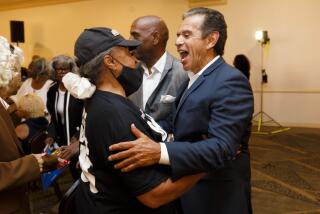Dollars and good sense
A YEAR AGO, Mayor Antonio Villaraigosa came up with a plan to hike trash collection fees; then he promised to use the added income to make sure Los Angeles expanded its police force. Because the trash money couldn’t actually be earmarked for cops, it’s hard to say whether any particular dollar hired any particular new officer. But this much is clear -- the mayor exceeded his goal for hiring new officers and began a program to slash a lingering structural deficit. Both moves are good ones.
One of the more prosaic, but in the end more important, hallmarks of Villaraigosa’s tenure has been his emergence as a careful guardian of the city’s budget. Homeowners should not begrudge him the fees they now must pay for garbage pickup that formerly was free. It wasn’t really free, of course, but rather was subsidized by taxpaying business owners and residential renters who didn’t get the benefit of free service. The new income helped pay down part of a year-to-year deficit of $295 million -- solid evidence of Villaraigosa’s fiscal prudence.
He’s not out of the woods. Help in recent years came from a soaring real estate market that produced higher-than-expected property tax revenue. The Los Angeles market hasn’t cooled to the same extent as the rest of the nation, but there is an unmistakable drop-off in sales, and Villaraigosa may not have the same windfall he enjoyed last year.
It’s a good thing, then, that instead of using the financial good times to go on a spending spree, the mayor has steeped himself in conservative financial planning. He has put paying down the deficit at the top of his budget agenda and plans to erase another $138 million this year.
He could go further. His budget doesn’t realistically account for raises that city workers will demand in new contracts, due to be negotiated this year. The low figures he’s floating now may be a tactical shot across the bow to workers, warning them to keep their expectations low, and that’s a good thing. But he knows he will be paying workers larger raises than the small increases his budget suggests, so some of his other figures must be taken with a grain of salt. Boosting the city reserve fund to $187 million is a good move -- but only if the money actually ends up there.
There are other contingencies that are not accounted for, such as a possible loss of $270 million in cellphone excise taxes because of a lawsuit challenging those taxes. That’s a staggering sum, and that money would have to come from somewhere. But the mayor has assembled a solid team and demonstrated a refreshing maturity in budgeting for the city’s needs. And as for what that means, in the most basic terms, Los Angeles today has 231 more police officers in uniform than it did a year ago.
More to Read
Sign up for Essential California
The most important California stories and recommendations in your inbox every morning.
You may occasionally receive promotional content from the Los Angeles Times.










